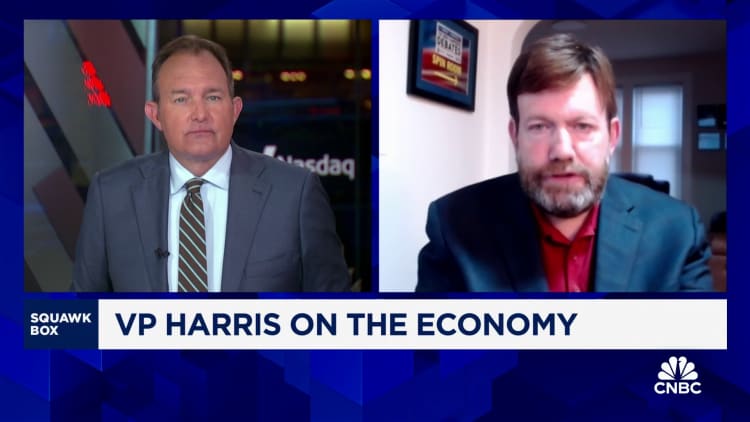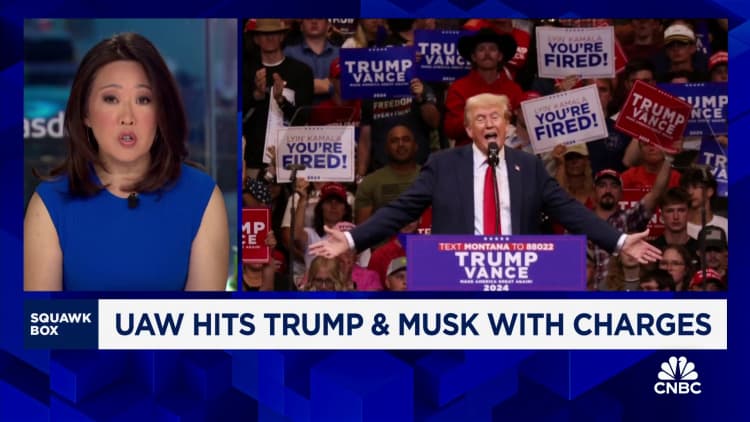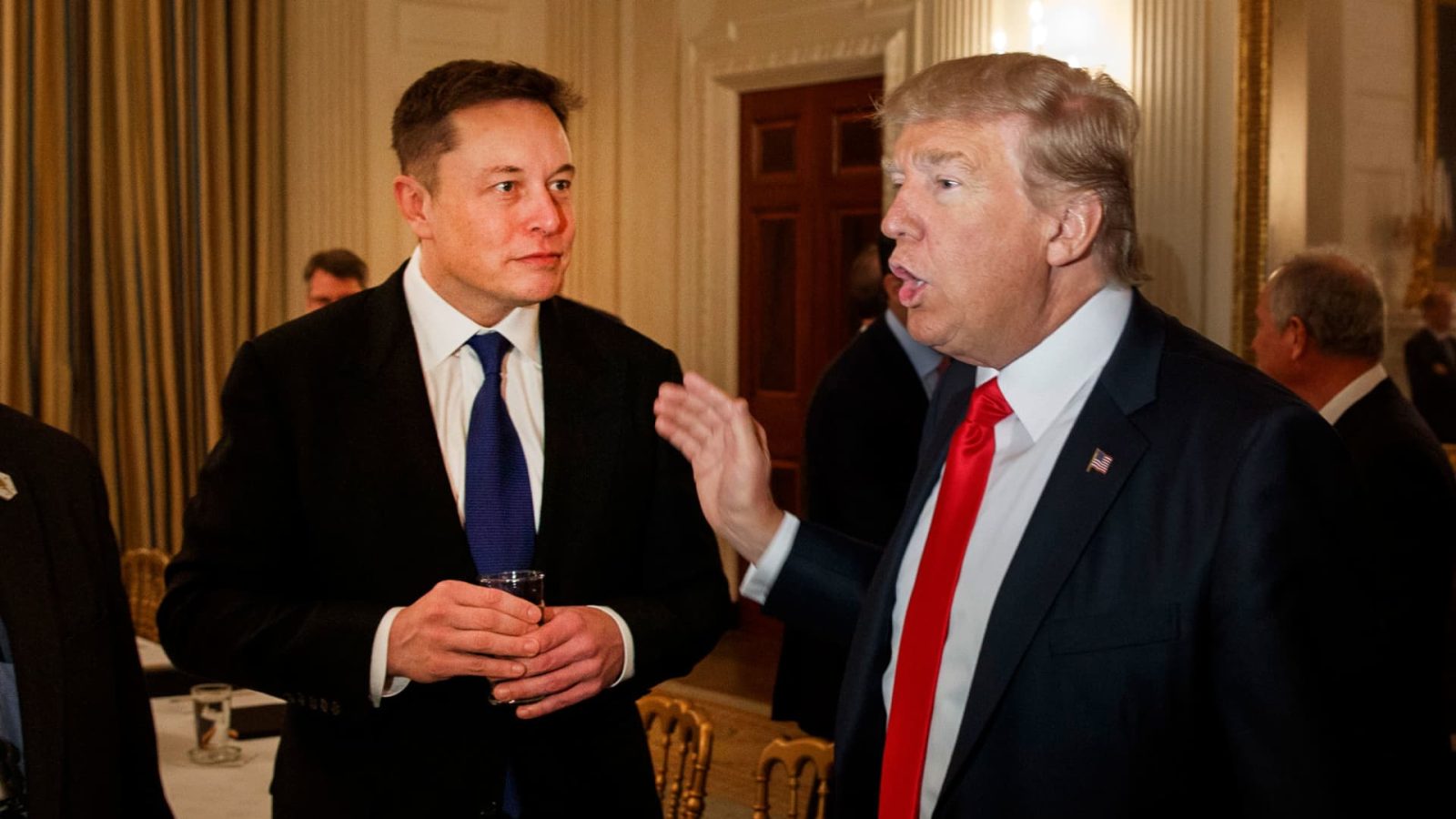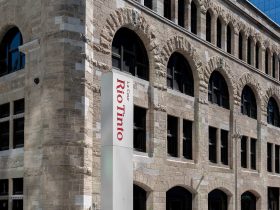Elon Musk’s endorsement of former President Donald Trump was meant to buoy the candidate’s chances in November. But more than a month after Musk officially put his weight behind Trump, a series of Democratic attacks have suggested that the endorsement has exposed a vulnerability.
Since the tech billionaire endorsed Trump on July 13, the campaign of Vice President Kamala Harris has repeatedly attacked Musk for his anti-worker stances. The campaign has called Musk and Trump “self-obsessed rich guys” and reposted audio from an event on Musk’s social media app, X, in which the two laugh together about firing striking workers.
Harris allies including Shawn Fain, the president of the United Auto Workers, have followed up with attacks of their own, and now some Democratic strategists look eager to keep highlighting the Musk-Trump alliance, which they see as reinforcing Trump’s weak points.
“Every time that Elon Musk tries to do something to help Donald Trump, I think it fires up the Democratic base to work against him,” said Pete Giangreco, a Democratic strategist based in Chicago.
“If you’ve got a billionaire helping out someone who says he’s a billionaire, but really isn’t, what does that really get you?” he said.
Musk did not respond to a request for comment on the Democrats’ attacks or the impact of his endorsement.
Musk’s endorsement was supposed to hit the Trump campaign like a lighting bolt. He announced it the same day the former president survived an assassination attempt. His backing signaled that Trump would have all the cash and social media firepower he needed to regain the White House, and it added to a perception that Trump had won over a big share of America’s tech industry and entrepreneur class.
Musk’s endorsement was arguably the most high profile and coveted of this election cycle, given his unprecedented mix of wealth, celebrity and media reach.
But the weeks since have been defined by stumbles and missed opportunities. The two men publicly disagreed about how much money Musk would chip in. Musk’s super PAC went through a major staff shake-up soon after it launched. And many other Big Tech donors have declined to follow Musk’s lead, choosing instead to sign onto the Harris campaign.
Then there was the live one-on-one discussion on X, which Trump’s campaign billed as “the interview of the century.” Partway through the two-hour event, Trump brought up how much he admires Musk’s handling of labor unions.
“I look at what you do. You walk in and you just say, ‘You wanna quit?'” Trump said while laughing.
“Yeah,” Musk broke in, also laughing.
“They go on strike,” Trump continued. “I won’t mention the name of the company, but they go on strike, and you say, ‘That’s OK, you’re all gone. You’re all gone, so every one of you is gone.’ And you are the greatest.”
The Harris campaign quickly jumped on the exchange with a post on X that has been viewed 7.2 million times. And it has posted about the exchange at least three times since.
Harris’ campaign added in a statement soon after the event: “Trump’s entire campaign is in service of people like Elon Musk and himself — self-obsessed rich guys who will sell out the middle class and who cannot run a livestream in the year 2024.” (The event was delayed 40 minutes by technical difficulties.)
The episode snowballed. The United Auto Workers union filed unfair labor practice charges against Musk and Trump, alleging they interfered with workers who may want to exercise their labor rights. The UAW’s Fain pressed the issue in media interviews. Acting Labor Secretary Julie Su said at an event at the Democratic National Convention: “You can’t be pro-Elon Musk and pro-worker.”
Sean O’Brien, general president of the International Brotherhood of Teamsters, who spoke at the Republican National Convention in July, slammed Trump and Musk’s comments as “economic terrorism.”
American workers’ right to strike is guaranteed by the National Labor Relations Act of 1935.
The criticism of labor unions is likely to motivate part of the Democratic base, said Chuck Coughlin, a Republican-leaning campaign consultant.
“If I were the Harris campaign, I’d lean on that, too,” he said.
Harris leads Trump by 10 points among people who live in union households, according to a Fox News poll conducted Aug. 9-12.

Brendan Steinhauser, a Republican strategist in Texas, said Democrats appear to be pulling from the playbook they used in 2012 to defeat Mitt Romney, who also appeared to hold a casual attitude toward job cuts.
“They want to make Trump, Elon and people like them look like plutocrats,” he said.
Steinhauser said there’s a danger for Republicans that the message could resonate in strong union states like Michigan.
“It can land if delivered effectively. I don’t think it will land, but it can,” he said, adding that it’s tough for any one message to break through in a crowded media environment.
Musk has a long record of opposing organized labor and has fought allegations of illegal anti-worker activity at his companies Tesla, SpaceX and X. In 2018, he tweeted that unionized Tesla workers would lose stock options, which Tesla’s lawyers said was protected “employer speech.”
In January, Musk responded to allegations from the National Labor Relations Board against SpaceX with a countersuit asking a federal court to declare the NLRB’s system of administrative law judges unconstitutional.
Labor union leaders have been harshly critical of Trump’s time in office, citing his appointment of conservatives to the NLRB and the federal courts. At the same time, Trump has sought to maintain some ties to organized labor, inviting some union leaders to the White House while he was president and continuing to court the Teamsters.
Seth Harris, a former labor policy adviser to President Joe Biden and a senior fellow at the Burnes Center for Social Change at Northeastern University, said he believes Trump wants to be ambiguous on the subject of labor unions, a goal that he said is now much more difficult.
“Elon Musk created the opportunity that Donald Trump took to unmask himself as rabidly anti-union, and he did that by praising Elon Musk’s anti-union, union-busting perspective and endorsing the idea of illegally firing striking workers,” he said.
Harris, who is not related to Kamala Harris, said he views Musk’s endorsement as a net negative.
“No one views Elon Musk as a voice of the middle class,” he said. “Musk is a rapacious corporate overlord who did everything in his power to destroy organizing efforts at Tesla and also at SpaceX.”
David Nasaw, the author of books on business magnates such as William Randolph Hearst and Andrew Carnegie, questioned Musk’s ability to sway voters: “Even those who think he’s a genius with regard to AI and tech and space travel, that doesn’t translate into presidential campaigns.”
“I’m trying to think of the demographics that are going to be swayed by Musk repeating Trump’s attacks,” he added. “If they don’t believe Trump, are they going to suddenly come to his side because Musk says he’s right?”
Nasaw said he sees a parallel with Hearst, a newspaper and radio baron who tried and failed to defeat President Franklin D. Roosevelt in 1936 and 1940 by using his media empire to stir up opposition. Musk showed similar aspirations in 2022 when he bought X, and he frequently uses the app to attack Harris and Biden.
“When it came to elections, nobody really trusted Hearst and there was no reason to trust Hearst. I think the same is true with Musk,” he said.
“Once upon a time there was this legion of Musk bros who hung on his every word — who believed he was not only a genius but a genius who was dedicated to saving the planet,” he said. “I don’t think that’s the case anymore.”
Nasaw said he believes Musk has become “too far out there” to attract widespread support, citing Musk’s antisemitic statements and his views about birth rates.

In a March poll by Grinnell College, 47% of respondents said they had a favorable view of him, with 37% having an unfavorable view. For comparison, Taylor Swift in the same poll was seen favorably by 52% and unfavorably by 32%. Her potential endorsement in the presidential race is also highly anticipated.
A USA Today/Suffolk University poll in May ranked Musk as the sixth most influential kingmaker among celebrities, just behind Oprah Winfrey, with 15.2% of respondents saying Musk’s endorsement for president would have “a lot” or “a little” influence on their vote. But the poll found that his influence was largely limited to Republicans, indicating he may not bring many Democratic-leaning voters into the Trump camp.
Coughlin said Musk and Trump have similar fan bases.
“I see it as drawing from the same well,” he said.
Both Trump and Musk have discussed the possibility of Musk serving in a second Trump administration, at least in an advisory role.
In recent years, Musk has vacillated not only on Trump but on whether he would endorse a candidate at all this election cycle. Musk said in 2022 that Trump should not seek the White House again and he frequently describes himself as a former Democrat.
As recently as March, Musk struck a pose of neutrality in the presidential race.
“Just to be super clear, I am not donating money to either candidate for US President,” he posted on X, three days after meeting Trump over breakfast in Palm Beach.
Two months after that post, Musk set up a super PAC, a type of political action committee that can raise unlimited cash for independent political activity, not coordinated with a candidate. The committee, America PAC, is now running ads supporting Trump and opposing Harris.
Seth Masket, a University of Denver political science professor who has studied the power of endorsements, said the backing of a famous person or media purveyor can sometimes make a difference in a primary election, as when Winfrey boosted then-Sen. Barack Obama’s presidential campaign with her endorsement in 2007.
But the evidence is thin for endorsements in general elections, especially in a relatively polarized era, he said.
“Even a very famous person’s endorsement is not going to change very many people’s minds,” he said.
Musk’s ownership of X adds to his potential influence: He has the most followers on X with more than 195 million and controls its algorithm, at times pushing his own posts higher in the feed. But X remains a much smaller app than competitors such as Instagram, TikTok or YouTube, and its growth has slowed.
“I don’t know how many people who are undecided in this race are relying on Twitter,” Masket said, using X’s previous name.
If Musk’s endorsement has sway with voters, it’s likely to be among a very specific group, said Thad Kousser, a political science professor at the University of California San Diego who has studied endorsements.
“There are many people in this techno-libertarian, young-voter world who aren’t as set in their ways and locked into one party or another.” Kousser said. “They may be up for grabs in this election.”
But as Trump’s poll numbers have sagged, Musk has shown signs of toning down his enthusiasm, if not outright signs of buyer’s remorse. Musk did not speak at the Republican National Convention, despite early discussions among Trump and his allies for him to do so.
And on July 22, two days after Trump boasted to a Michigan crowd that Musk “gives me $45 million a month,” Musk said the figure was not true. He added on X that he would give “at a much lower level.” So far, Musk’s name hasn’t appeared as a donor on public campaign finance disclosures except for a $10,000 donation to the Utah Republican Party, though there is a lag in reporting.
“If he comes through on these promises to donate tons of cash, and that cash is well spent by the Trump campaign, then that could have an effect,” said Nasaw, the biographer.
“But I see no signs that, one, he’s going to follow through and give the money he’s promised or, two, that the Trump campaign is organized in such a way as to make use of that money,” he said.
Read the full article here





Leave a Reply